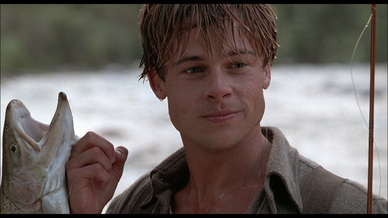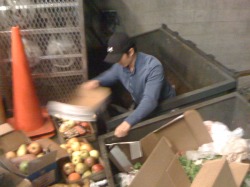Is there a movie that has ever freaked you out because of its semblance to your own life?
On a road trip from Los Angeles to a suburb of San Francisco, I tried to make conversation with my father. As usual, I had to ensure that we stayed off of certain topics, such as my choice to pursue a career in journalism. My dad went to school to become an engineer, a much safer and seemingly tougher career choice, so like many, he assumed that journalism would be loser career, if you could find a job in it at all.
I instead asked Dad what his favorite film is, and he told me the plot of A River Runs Through It, a film eerily similar to the life of my dad. Both him and the main character grew up in a beautiful, natural setting, exploring with their respective brothers. They both ended up going off to University, and both their brothers were particularly bold, fun people.
I decided to record and watch the movie when we got to my parents' house. Soon after I started it, my dad came in to watch. I don't think he had seen it in a long time.
Dad sometimes says that I remind him of his brother, Dan: risky, curious, energetic. Dan has explored many topics and climbed many mountains: a true fencehopper, and all. Dan is also like the character in A River Runs Through It, the younger brother named Paul, who tries new things, gambles, and becomes a successful journalist. Paul's colorful personality and open mind make his writing shine, and his words immortal.
 There is one more similarity between my dad's life and that of Norman, the older brother in the film. Their brothers, Paul and Dan, lived very exciting lives, and their antics both worried and amused their families. Ultimately, through their dangerous lifestyles and a whole lot of bad luck, they were both killed in their prime.
Later, as always, we got back onto the subject of journalism as my career. This time, my dad said something different than usual.
"Actually, I think you'd make a good journalist." I was surprised to hear this, of course. "You've got an inquisitive mind, like Dan. He could have been a journalist too."
I don't think anyone in my family believes in reincarnation; I know I don't. I just happen to be similar to my uncle Dan, and Dan just happens to be similar to Paul. And Paul was a journalist. So now, because I saw a movie and reminded my dad of the kind of person his brother was, I have Dad's blessing and the chance that Dan lost.
The students in Writing, Reporting and Ethics took these pictures to represent their weekend. Kristine's was the photo of the man performing in Little Tokyo. "He's there performing every weekend." Kristine says that this performer has been on America's Got Talent. Monica works as the worship coordinator at a Church called Shepherd of the Hills, where she entertains kids with videos, coordinates plays, and teaches them bible study. "It's a lot for [the kids], it's fun." My picture is the one where I'm climbing on rocks. Some of my floormates and I have a bike race this saturday, and we trained by checking out the Chatsworth resevoir. We saw coyotes and places to climb, but there was no water in the resevoir.
 There's no diving board involved in dumpster diving, and it's not so theatrical and dangerous as to literally go swimming in garbage. Instead, the Los Angeles Dumpster Diving Meetup Group quickly and carefully sifts through discarded material in commercial dumpsters to "save" landfill-bound goodies.
Last Saturday night in Garfield Park, Pasadena, about a dozen people gathered to take part in this seldom-known art. The group's members are from Meetup.com, a website that connects people with similar interests to other locals. The group went to the dumpsters of Bristol Farms and Trader Joe's to recover apples, bananas, artichokes, iced tea, bagels, banana bread, potatoes...and enough food to fill the back of a flat-bed truck. At the end of the night, the divers took what they wanted from the truck, and the rest was donated to a soup kitchen.
Julianne Lee, a 25-year-old graphic designer, was going dumpster diving for the first time that night. "I want to see if it's true that companies throw away as much as people say they do, to see how wasteful we can be as an American society," said Lee while the group waited for the employees at Trader Joe's to leave.
Although divers scavenge for many things, including technology, clothes, and whatever else they can find in these back-alley treasure chests, this particular diving venture uncovered food. According to a 2004 study at the University of Arizona, Tuscon, the United States throws away nearly half of its food supply.
The group organizers were 45-year-old computer programmer Eric Einem and 21-year-old full-time volunteer Grace.
"For some it's about reducing their consumption...and recovering wasted resources. For others, it's about free food. For others, it's just fun," said Einem of dumpster diving.
This practice is, in addition to being a hobby or necessity, based on community. When Grace moved to LA, she "discovered that LA has, really, no freegan [those who salvage and scavenge goods] community, so I thought, 'well, let's build one!'"
The community has many attractive aspects to it. Those who are anti-establishment and anti-consumerism participate in freeganism because, as no money changes hands, it does not contribute to capitalism. Environmentalists take part because it saves food and goods from going to a landfill as well as minimizes the need for producing more food, which takes energy, water, and land. Humanitarians dumpster-dive to donate food to organizations like Food Not Bombs, which gets much of their food from dumpsters to help the hungry. The food is free, so it is good for frugal people (although oddly, there doesn't appear to be a huge increase with the recession.) Also, the thrill of treasure-hunting at night should enthuse any adventurer. The best adventurers ever, Flapjack and K'nuckles, are into it.
According to Freegan.org.uk, there are many reasons a store would choose to throw away food products. Sometimes it's because the food has gone bad. If this is the case, it's as apparent to the diver as it is to the clerk, and the freegan will toss it away again.
However, the majority of the time food is thrown away because the packaging is damaged, it's near or past its sell-by date (but not its use-by date), one item in a pack is damaged, there is seasonal wrapping, or the store wants to make room for new merchandise.
If you're in the Los Angeles area, you can go to meetup.com/freegan to accompany this group on a diving trip. If you live elsewhere, check the 21 other meetup.com groups created in this growing movement.
|


 RSS Feed
RSS Feed